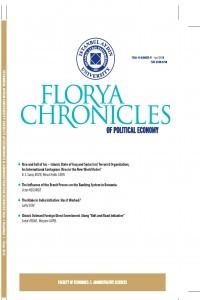Economic Development In Africa: Salient Trends and Priorities
Economic Development In Africa: Salient Trends and Priorities
Economic growth of African countries accelerated since the 2000s, and caught up with that of other developing regions. Rising prices of commodities, particularly minerals and metals as well as fuels, which comprise a large part of Africa’s exports, had an important influence on this positive picture. However, as growth fades in China which was instrumental in stimulating demand and pushing up the commodity prices, Africa’s economy will be negatively affected. A majority of Africa’s international trade is with developing countries. African countries must reduce dependence on commodities and search for alternative development paths. This is a return to the pre-2000s, when commodity prices were considerably lower. Diversification, improving productivity and the quality of African products, as well as more effective participation in global value chains appear as the policy objectives to follow. Given the low levels of income, foreign direct investment can be instrumental in African development. Foreign direct investment has been mostly flowing into natural resources but intraIn spite of the potential instructive value of individual success stories and stories of failure, this paper refrains from providing specific country examples. They can be found in some of the references provided below. The focus is on a few interrelated meso-level issues, which need to be tackled with priority from the point of view of attaining sustained and sustainable development for a significant number of African, and particularly SSA, countries. These reflect global and regional realities African investment favours manufactures and services. These sectors are closely related to the demands of the rising middle class. The allocation of natural resource rents to productive investments is also important. Better governance would help in this respect as well as in stimulating foreign direct investment. Education is an important component of all development policies
Keywords:
Africa, economic development, commodities, natural resources, diversification, foreign direct investment global value chains,
___
- [1] Arda, M. (2014). Commodities and the Istanbul Programme of Action: The first two years. In LDCIV Monitor, Istanbul Programme of Action for the LDCs (2011-2020) Monitoring Deliverables, Tracking Progress – Analytical Perspectives (pp. 195-228). Commonwealth Secretariat,London
- [2] Chen, W., Dollar D., & Heiwai, T. (2015, August). Why is China investing in Africa? Evidence from the firm level. Retrieved on August 25, 2015. http://www.brookings.edu/~/media/research/files/papers/2015/08/why-china-is-investing-in-africa/why-is-china-investing-inafrica.pdf,
- [3] Corruption perceptions index 2014: Results. (n.d.). In Transparency International. Retrieved on August 25, 2015, from. https://www.transparency.org/cpi2014/results.
- [4] Cortez, A. L., & Arda, M. (2014, September). Global trade rules for supporting development in the post-2015 era. CDP Background Paper No. 19 (ST/ESA/2014/CDP/19), 1-23. Retrieved on August 25, 2015 from http://www.un.org/en/development/desa/policy/cdp/cdp_backg round_papers/bp2014_19.pdf.
- [5] The Economist Intelligence Unit. (2015). Executive summary. In Risk and return: Foreign direct investment and the rule of law (pp. 8-11). London: Hogan Lovells. Retrieved on August 25, 2015, from http://www.biicl.org/documents/626_ 10071_d4_fdi_main_report_v4_-_final_exec_sum_only.pdf
- [6] Elms, D. K., & Low, P. (eds.). (2013). Global value chains in a changing world. Switzerland: World Trade Organization Secretariat. Retrieved on August 25, 2015, from https://www.wto.org/english/res_e/booksp_e/aid4tradeglobalva lue13_e.pdf.
- [7] Extractive industries transparency initiative. (n.d.) Retrieved on August 25, 2015,from https://eiti.org/.
- [8] Food and Agriculture Organization. (2013). Part 3: Feed the world. In Statistical Yearbook 2013 (pp. 123-199). Rome: Food and Agriculture Organization August 25, 2015 of the United Nations. Retrieved on August 25, 2015 from http://www.fao.org/docrep/018/i3107e/i3107e03.pdf.
- [9] Lee, M., & Gueye, C. A. (2015, April). Do resource windfalls improve the standard of living in Sub-Saharan African countries? Evidence from a panel of countries. International Monetary Fund Working Paper (WP/15/83), 1- 38. Retrieved on August 25, 2015 from https://www.imf.org/external/pubs/ft/wp/2015/wp1583.pdf.
- [10] Manson, K. (2015, June 16). Nestlé cuts Africa workforce as middle class growth disappoints. Financial Times. Retrieved on August 25, 2015, from http://www.ft.com/cms/s/0/de2aa98e-1360-11e5-ad26- 00144feabdc0.html#ixzz3kCLexBTi.
- [11] Rodrik, D. (2005, December). Policies for economic diversification. CEPAL Review, 87: 7-23. Retrieved on August 25, 2015, from http://repositorio.cepal.org/bitstream/handle/11362/11111/870 07023I_en.pdf?sequence=1
- [12] Rodrik, D. (2015, August 13). Back to fundamentals in emerging markets. Project Syndicate. Retrieved on August 25, 2015, from http://www.project-syndicate.org/commentary/emergingmarket-growth-by-dani-rodrik-2015-08#r5JKeqlASEkl6yIt.99.
- [13] United Nations Conference on Trade and Development. (2012). World investment report 2012: Towards a new generation of investment policies. Switzerland: United Nations (UNCTAD/WIR/2012).
- [14] United Nations Conference on Trade and Development. (2014a). World investment report – Investing in the SDGs: An action plan. Switzerland: United Nations (UNCTAD/WIR/2014)
- [15] United Nations Conference on Trade and Development. (2014b). UNCTAD handbook of statistics: 2014. New York: United Nations (TD/STAT.39).
- [16] United Nations Conference on Trade and Development. (2014c). Economic development in Africa report 2014: Catalysing investment for transformative growth in Africa. New York: United Nations (UNCTAD/ALDC/AFRICA/2014).
- [17] United Nations Conference on Trade and Development. (2015). The state of commodity dependence 2014. Geneva: United Nations (UNCTAD/SUC/2014/7).
- [18] United Nations Development Program. (2013). Human development report 2013 – The rise of the South: Human progress in a diverse world. New York: United Nations.
- [19] World Bank Group. (2015). Doing business 2015: Going beyond efficiency. Washington, D.C.: International Bank for Reconstruction and Development/ The World Bank.
- ISSN: 2149-5750
- Yayın Aralığı: Yılda 2 Sayı
- Başlangıç: 2015
- Yayıncı: İstanbul Aydın Üniversitesi
Sayıdaki Diğer Makaleler
Relationship Between Political Instability & Growth In Some Selected Mena Countries
Turkey’s Education Diplomacy With Africa
Development as Systems: Systems Frameworks, Sub-Saharan African Development, and Health Systems
Food Security And Drawbacks Of Neo-Liberal Food Policies
Political Violence and Terrorism: Insight Into Niger Delta Militancy and Boko Haram
Özüm Sezin UZUN, Yusuf Saheed ADEGBOYEGA
Economic Development In Africa: Salient Trends and Priorities
Sanal Organizasyonların Yönetim Fonksiyonları Açısından Geleneksel Organizasyonlardan Farklılıkları
Psikolojik Sermaye Kavramı Üzerine Bir İnceleme
Lord Curzon and the Use of Secret Intelligence at the Lausanne Conference: 1922-1923
